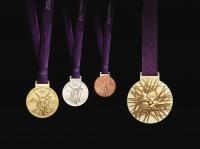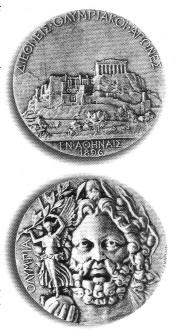Ireland’s first (official) Olympic medals, London 1908
Published in 20th-century / Contemporary History, Features, Issue 4 (July/August 2012), Volume 20
The gold, silver and bronze medals (and reverse) that will be awarded at the 2012 London Olympics. The London games of 1908 were the first in which gold, silver and bronze medals were officially awarded.
John Pius Boland was Ireland’s first Olympic champion but he was not our first ‘gold’ medallist—his prizes in Athens in 1896 were silver medals and olive wreaths. Up until London, the awards for first, second or other places in any Olympic final were at the discretion of the organising committee of the games concerned. Such diverse awards as national championship medals, cups, umbrellas and even a penknife were awarded to winners and second-placed finalists, with the Paris games of 1900 being particularly eclectic in terms of trophies.Ireland’s first ‘gold’ medallist was probably Tom Kiely, who certainly took home such a medal for winning the all-round athletic championship at St Louis on 4 July 1904. Unfortunately, controversy over whether Kiely’s victory was in a full Olympic event continued up to the 1950s, when the persistent campaigning of Hungarian Olympic historian Ferenc Mezo resulted in official IOC recognition of Kiely’s achievement. There is still some debate as to whether Kiely was representing Great Britain or Ireland, as in 1904 Ireland was part of the United Kingdom. Modern research has tended more and more towards the view that Kiely’s own nationalism and the lack of an official British team at St Louis—or, indeed, of a British Olympic association at all in 1904—combine to suggest that ‘Ireland’ is justifiably used as Kiely’s national tag in most record books today.

Front and back of one of John Pius Boland’s two silver medals for winning both singles and doubles tennis in Athens in 1896. Up to 1908 the awards for first, second or other places in any Olympic final were at the discretion of the organising committee of the games concerned.
As the Olympic Games grew, the chaotic and unsatisfactory state of affairs regarding prizes could not continue, and at the International Olympic Committee’s congress at the Hague in 1907 a resolution was passed that in all future Olympic Games the winner in each event would be awarded a gold medal, the second-placed finalist silver and the third-placed finalist bronze. Thus London in 1908 would be the first games where these medals were awarded. That arrangement only lasted until the next games in Stockholm in 1912, such was the prohibitive cost of providing gold medals for all winners. For the Antwerp games of 1920 the ‘gold’ medal was in fact a silver-gilt medal, and such has been the ‘gold’ medal awarded ever since.If the 1908 London Olympic Games were the first in which gold, silver and bronze medals were officially awarded, it is not a straightforward matter to identify who had the unique distinction of being the first medal-winners. Some events in less popular sports, namely racquets and shooting, were held before the official opening. Leaving that anomaly aside, the first gold, silver and bronze medals won after the opening of the London Olympics had a special significance for Ireland and Irish-born athletes. The events timetable is known and consequently the first event and its winner, second- and third-placed finishers can be identified.The London games commenced on Monday 13 July 1908 with the opening ceremony. Immediately following this, the heats of the 1500m took place, with only the eight heat-winners proceeding to the final, held the next day. On this first full day, 14 July, there were two finals, the 1500m and the hammer throw. The timetable showed that the preliminary throws in the hammer started at 10am; each of the nineteen competitors had three throws and then the three leading throwers had three more throws each. On his very last throw, John Flanagan, the 1900 and 1904 Olympic champion, got off his longest throw and won his third Olympic hammer championship by 2ft 5.25ins over Matt McGrath, the world record-holder, who was second, with Con Walsh third. Calculating the time taken to complete the preliminary throws and the final three throws, the entire competition could have taken no longer than four hours or, at the latest, finishing well before 3pm. We know from the timetable that the 1500m was due to start at 4.40pm or approximately one hour and 40 minutes after the hammer competition was completed. In fact, in the most authoritative source on the 1908 London games, Bill Mallon and Ian Buchanan suggest that the 1500m final actually started at 5.20pm on 14 July. Thus the hammer was the first of the 1908 Olympic athletic events to be decided. So John Flanagan of Limerick, Matt McGrath of Tipperary and Con Walsh of Cork were the first winners of official Olympic gold, silver and bronze in athletics, a unique achievement that can never be repeated. But while these great Irish sportsmen could not have been more Irish, they could not compete for ‘Ireland’. Flanagan and McGrath represented the United States and Con Walsh represented Canada. Irish-born athletes won seven of the first eight Olympic hammer titles between 1900 and 1932. Sadly, the three 1908 medallists are not listed as Irish in any Olympic records but it can never be denied that Ireland was the first nation to win the gold, silver and bronze medals in the same Olympic athletic event. The only Irish hammer-thrower whose nationality is recognised as Irish in these records is Dr Pat O’Callaghan (1928 and 1932), and even he was denied the chance to win a third ‘gold’ in 1936 because of national and international arguments over what constituted ‘Ireland’ as an Olympic nation. HI
Cyril M. White is a retired UCD and American College professor and dean, with a lifelong interest in sport and sports scholarship.
















